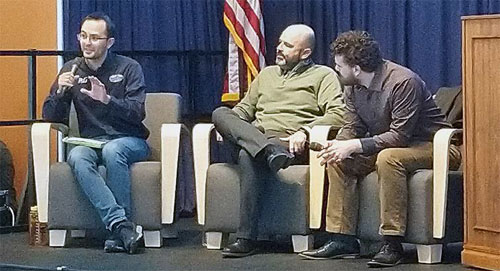Brice Wallace
For Tommy Montoya, it was flowers.
Several years ago, a bouquet of flowers sent by his Procter & Gamble work manager to his home while he was away on yet another business trip made a connection that still exists and has become “a story that sticks around,” he says.
“My wife, to this day, cites that as like a moment of P&G as an example of being in touch, and having that connection at a time when life is really hard. So, at times when maybe I’m a little bit frustrated with P&G, she goes, ‘No, it’s not that bad. They sent me flowers, right?’”{mprestriction ids="1,3"}
Speaking as part of a workforce panel at the recent Box Elder Business Summit presented by the Box Elder Chamber of Commerce, Montoya, now the human resources director at P&G’s Box Elder County manufacturing plant, cited the flowers as just one simple way for a company to bolster connections to employees, which can help companies get and keep the workers they need.
“Finding little things like that that aren’t necessarily committed, ongoing costs in terms of wages … it builds those stories, it builds that trust, it builds that connection to the company, for the individual and for the family, and that’s going to bring people in and keep people around,” he said.
Other panelists at the Brigham City event listed other ways for companies to do “little things” that can help them recruit and retain employees in today’s ultra-tight labor market. Sure, companies can offer $2 more per hour than a competitor, but “some really inventive business practices” might make more sense, according to Michael Jeanfreau, senior economist at the Utah Department of Workforce Services over Northern Utah.
“It is going to be a tricky time. Labor is hard to find. But I think this is when it’s really time to start being wise about how you’re spending your money, because the solution is not going to be throwing unlimited money at it. Nobody has that. It’s going to be clever ways to figure out how to keep your employees, how to get people in and how to make sure you are paying them in a way that matters, which isn’t always money,” he said.
Those can include a strong corporate culture, a measure of respect and opportunities for the employee to develop, he said. Flexible schedules and the ability to work from home are among other examples.
“There are a lot of people who are willing to interact with the market on their terms, and the more that employers are willing to go to employees’ terms, the easier it is,” he said.
Montoya describes it as “reformulating the employee value proposition.”
“The unemployment rate being what it is and this ‘Great Resignation,’ a lot of people starting to reconsider where they work and how they work, forced us, and I think all of us, to rethink about what we offer our employees,” he said.
That, he said, has turned the Great Resignation into the “Great Renegotiation.”
“People’s relationship with their employers is being renegotiated as you look at virtual work options and creative ways of working, not having to come to the office [if] they don’t want to be there every day. That starts to challenge people’s assumptions about what work is, and with the workforce being as tight as it is, employers have to respond,” Montoya said.
At P&G, the intangibles include an on-site gym and providing free fruit. The toilet paper maker also made sure employees got the TP they needed during the pandemic-caused shortages. “You’ve got to take advantage of the things that you’ve got,” he said as the audience chuckled.
The employer-employee connections that build trust can be on display during significant life moments such as deaths, births and weddings, he said. “These are big life moments where you as the employer are not the most important,” Montoya said, “but your presence can send a really big message about your caring.”
Peach City, a Brigham City restaurant, has never had trouble finding workers, according to owner Kevin Hall, in part because “there are tons of good, solid kids out there.” But kids today have complicated lives and many other activities tugging for their time. “So a lot of business owners won’t accommodate their crazy schedules,” Hall said.
A key at Peach City is having a positive culture, he said. That once meant that when teens wanted to attend their school prom during work time, their duties were covered by a group of former employees — now stay-at-home moms — who worked a day in their stead and had a fun time, he said.
Companies that make employees’ work a great experience will have those employees wanting to bring in family members and friends, Montoya said. That will, he said, keep “the cultural energy positive.”
“If you’ve got your employee value proposition right, then you can leverage your current employee base to go and find more people, because they’re going to know who is not working, just kind of waiting for the right opportunity, they are disgruntled with their current work, and they can sell them on the experience they have,” he said.
Getting employees a few at a time may be the norm now. Jeanfreau said there simply is not a huge group of workers that will be coming into the Utah workforce.
“We just have so many jobs that we just don’t have the bodies to catch up,” he said.
Less than 10,000 people in Utah are out of the labor market but should be in it, during a time when the state has 100,000 jobs posted. In Box Elder County, about 8,000 people are unemployed but the county has 30,000 jobs available.
“That means for us, as citizens of the state, we have opportunity all around us,” Jeanfreau said. “For the average citizen of the state, it’s a time of really, really, really good opportunity, where employers are going to invest in you.”{/mprestriction}








